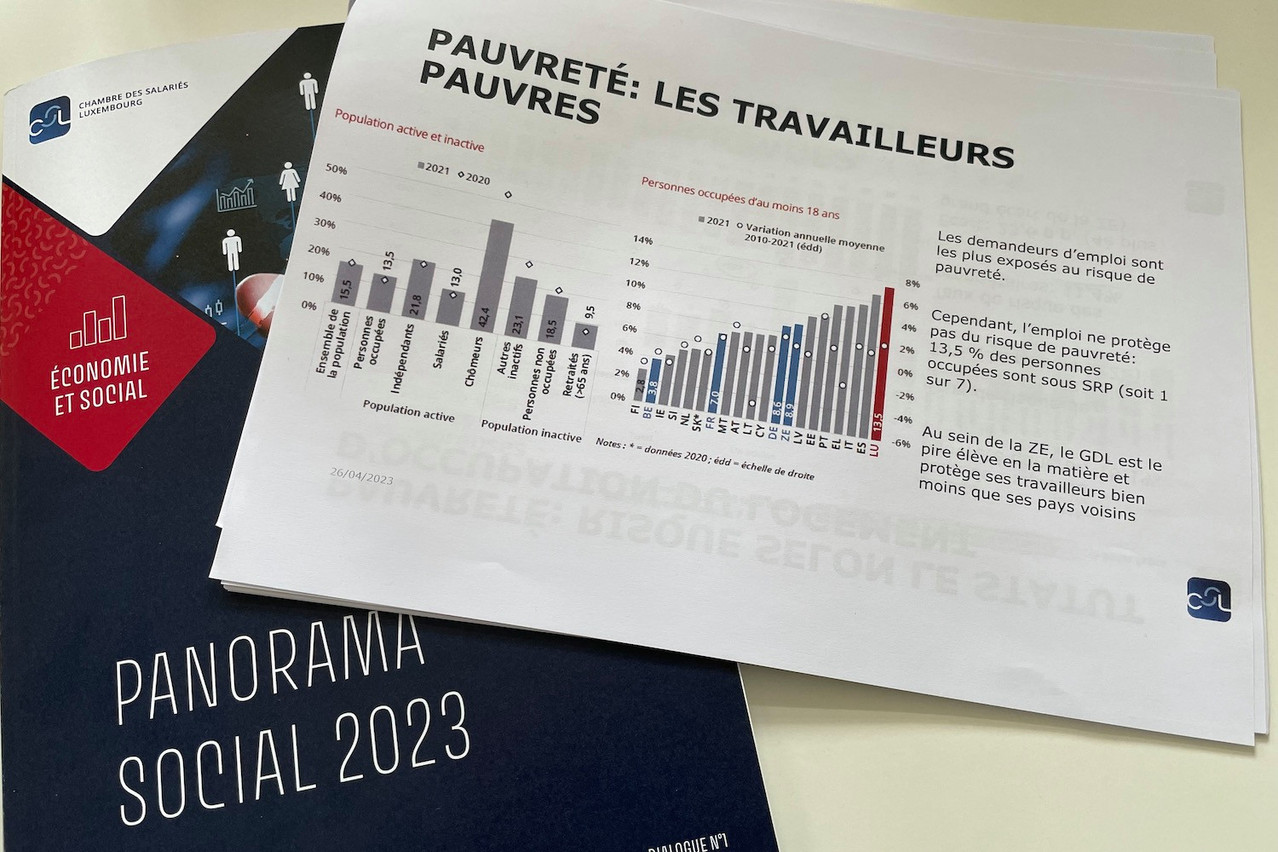The Chamber of Employees--or Chambre des Salariés--on 27 April published its annual “Panorama Social,” which takes a closer look at social inequalities, focusing on poverty, employment and the working environment.
“Even if we have good economic performance in the country, our social performance lags and isn’t that good. It’s something that we cannot simply accept,” said , president of the chamber, during a press conference.
Even though Luxembourg is a rich country, it is one of the worst performers in the EU on matters such as the working poor, she said, with a trend towards more--not less--inequality.
For example, nearly one in five people (18.1%) are at risk of falling into poverty, the report said. This number grows to 27.5% if there were no social benefits. The poverty risk is substantially higher among single parents (42.4%) and families with three or more children (40.3%). For larger families, the poverty risk has more than doubled since 2005.
One in seven working people over the age of 18 (13.5%) live at risk of poverty. This risk was higher (21.2%) for people working part time than for those working full time (11.8%).
Around 10% of people working part-time said they do so because they cannot find a full-time job. Around a third of women work part-time to care for their children or a dependent adult.
Back during the press conference once again advocated for reducing working hours at the same pay as well as a right to work part-time and return to full-time work.
Labour minister (LSAP) on Tuesday presented the on shortening the Luxembourg workweek, which did not offer a solid conclusion or recommendation but delivered food for debate as parties are claiming different stances on the issue ahead of parliamentary elections in October.
Wealth gap
Luxembourg’s housing crisis is also reflected in the data. More than a third of people renting housing (35%) are at risk of falling below the poverty line, the Chamber of Employees said. This was the third-highest score in the eurozone. But the poverty risk for property owners was at just 11.4%. The gap of 23.6 percentage points was the fourth largest in the eurozone.
More than half of benefits paid by social services last year helped pay for housing and household spending, such as electricity, water and gas.
And the wealth from property and other assets is only making the wealthy wealthier.
The number of households in the top 20% of income and the top 20% of assets at the same time has risen by 50% over the last 40 years. Félix Martins de Brito, an adviser at the chamber who presented the numbers on Thursday, said it showed a snowball effect: higher earners can invest their money which yields more return that they can invest, and so on.
The wealth gap is growing, he said, adding that this showed a lack of effective tax measures to distribute wealth.
The top richest 20% of the country earned 4.6 times more than the poorest 20%. At the same time the lowest wages barely progressed over the last two decades, the report said, unlike the top earnings, which were much more dynamic, De Brito said.
Making ends meet
The poverty threshold as calculated by Statec to live decently was at €2,177 per month for a single adult last year. But the net social minimum salary was at just €2,133. For a single parent with more than one child, net minimum income with family benefits was at €3,034, well below the Statec poverty threshold of €3,919 for people in that category.
One in five households (21.3%) indicated that they cannot make an unexpected payment worth €1,869. Again, this share was higher for single parents (45.1%) and larger families (36.2%).
The poor financial situation of households was also reflected in the rise in social grocery stores, where people can buy food at discounted prices with the help of NGOs such as Caritas and the Red Cross. Shoppers must be given access by a social welfare office.
While in 2014 just 4,182 people relied on the social grocery stores, this number swelled to 10,741 last year. “We’re not finding a way out,” said De Brito, adding that the stores were created in 2009 as a temporary measure to help people in the aftermath of the 2008 financial crisis. “This temporary measure will continue existing for a long time.”
